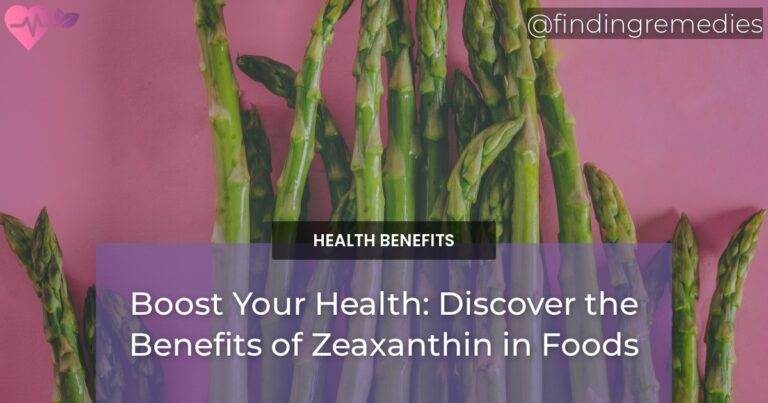There are many elements of a healthy lifestyle that require diligence, from regular exercise to adequate sleep. What often gets overlooked in the discussion of basic health is nutrition. Eating a healthy and balanced diet can be a great way to promote overall wellness. Have you heard of Zeaxanthin before? It’s an important nutrient that isn’t found in many other foods, and can give your diet a much needed boost.
In this blog post, we’re going to explore the health benefits of Zeaxanthin and explore some of the foods you can introduce to your diet to help boost your health. Zeaxanthin is a nutrient that’s part of a group called carotenoids, which not only lend some foods their vibrant colors, but can also improve your vision and guard against chronic age-related diseases. Additionally, Zeaxanthin can protect your eyes from damaging ultra-violet rays. We’ll cover how Zeaxanthin does this and how you can introduce it into your diet. Let’s get started on finding out the amazing health benefits of Zeaxanthin.
Introduction
Zeaxanthin is a powerful antioxidant that belongs to the carotenoid family. It is found in many yellow and green fruits and vegetables, as well as in egg yolks. Zeaxanthin is an essential nutrient that provides numerous benefits to our health, particularly to our eyes and skin.
Table of Contents
Types and Sources of Zeaxanthin
Zeaxanthin is found in many dietary sources, including:
- Dark leafy greens, such as spinach and kale
- Yellow fruits and vegetables, such as yellow peppers and corn
- Egg yolks
There are two types of zeaxanthin: L-zeaxanthin and R-zeaxanthin. L-zeaxanthin is the form of zeaxanthin that is found in nature and is the most beneficial for our health.
Zeaxanthin and Eye-related Diseases
Epidemiological studies have shown that zeaxanthin can reduce the risk of age-related macular degeneration (AMD), cataracts, and other ocular diseases. Experimental evidence suggests that zeaxanthin protects the retina from oxidative damage caused by blue light.
Zeaxanthin also helps to increase visual acuity, contrast sensitivity, and reduces glare sensitivity. It is considered one of the most important eye-friendly nutrients.
ALSO READ
Zeaxanthin and Skin Health
Zeaxanthin has also been shown to have potential benefits for skin health. It protects the skin from UV damage and reduces the risk of skin cancer. Zeaxanthin also helps to improve skin hydration, elasticity, and reduces the appearance of wrinkles and fine lines.
Zeaxanthin in Ocular Health and Disease
Research has suggested that zeaxanthin plays a crucial role in ocular health. It is responsible for protecting the retina from damage caused by oxidative stress, UV radiation, and blue light.
Zeaxanthin also plays a critical role in preventing age-related vision loss and ocular diseases, such as AMD and cataracts.
ALSO READ
Zeaxanthin: Metabolism, Properties, and Antioxidant Protection
Zeaxanthin is metabolized in the body to form zeaxanthin metabolites, which provide antioxidant protection to various organs, including the eyes, heart, liver, and skin.
Zeaxanthin has several unique properties that make it an excellent antioxidant, such as its ability to quench singlet oxygen and its high molar extinction coefficient.
Comparison of Zeaxanthin and Lutein-Based Supplements
While both zeaxanthin and lutein are important antioxidants for ocular health, zeaxanthin has been shown to have a higher antioxidant capacity. It also has a protective effect against DNA damage, which may help to reduce the risk of cancer.
Potential Role of Zeaxanthin in Cataract and Age-Related Macular Degeneration
Zeaxanthin has the potential to prevent cataracts and age-related macular degeneration. It does so by protecting the retina from oxidative damage, reducing inflammation, and improving visual function.
Zeaxanthin and Cognitive Health
Experimental evidence suggests that zeaxanthin may have a positive impact on cognitive health. Clinical trials have shown that zeaxanthin supplementation can improve cognitive function, particularly in older adults.
Molecular Mechanisms and Clinical Implications of Zeaxanthin for Disease Prevention
Zeaxanthin exerts its protective effects on our health through several molecular mechanisms, such as its antioxidant properties, anti-inflammatory effects, and neuroprotection.
The clinical implications of zeaxanthin are significant, particularly for the prevention of age-related diseases and eye diseases.
Zeaxanthin and Visual Function
Zeaxanthin has multiple mechanisms of action in the eye and beyond. It helps to improve visual function by reducing glare sensitivity, improving contrast sensitivity, and increasing visual acuity.
Safety and Risk Factors of Zeaxanthin
Zeaxanthin is safe for consumption, and there have been no reports of adverse effects associated with its use. However, it is important to note that excessive consumption of zeaxanthin supplements may increase the risk of carotenemia, a harmless condition characterized by orange skin discoloration.
How Does Zeaxanthin Compare to Lycopene in Terms of Health Benefits?
Zeaxanthin and lycopene both offer powerful health benefits. Zeaxanthin is known for promoting eye health, while lycopene is praised for its role in reducing the risk of certain cancers and cardiovascular disease. Both nutrients are important for overall health and should be included in a balanced diet.
Conclusion
Zeaxanthin is a powerful antioxidant that provides numerous health benefits, particularly for our eyes and skin. Incorporating zeaxanthin-rich foods in our diet or taking zeaxanthin supplements can help to reduce the risk of age-related vision loss, ocular diseases, and skin cancer. It is a natural compound that can be used as a preventive measure against oxidative stress and inflammation, which are risk factors for many chronic diseases.
RELATED ARTICLES:

